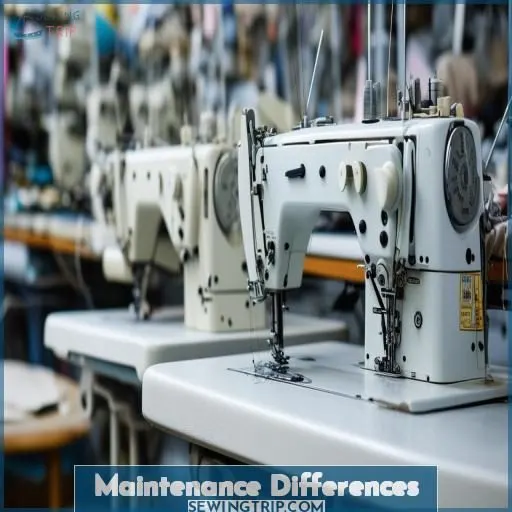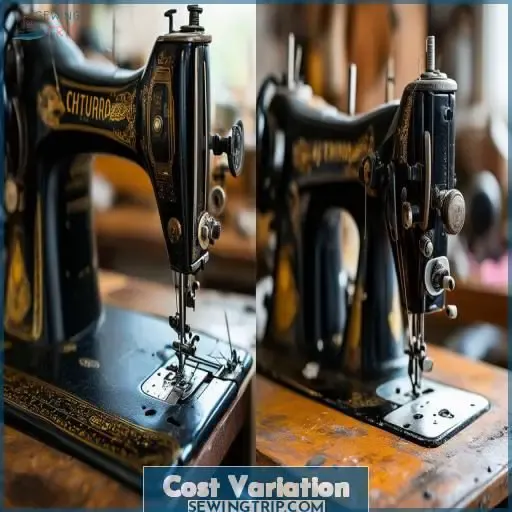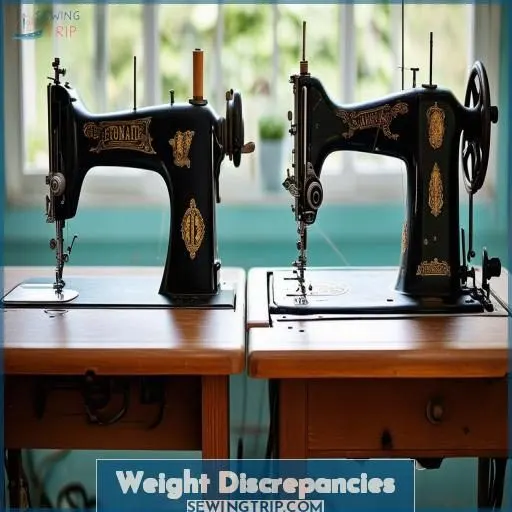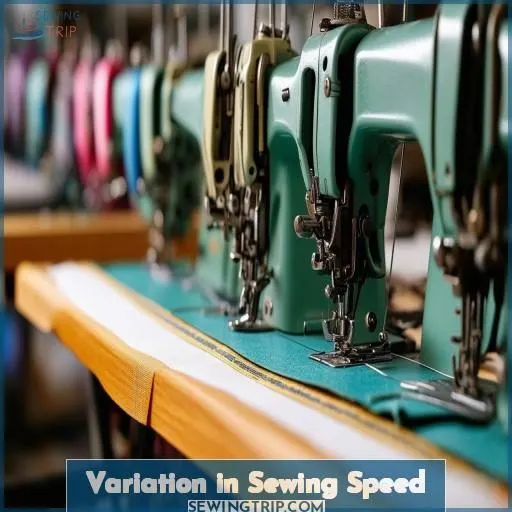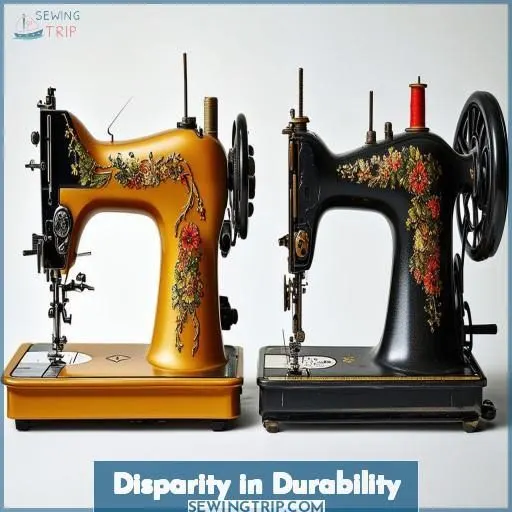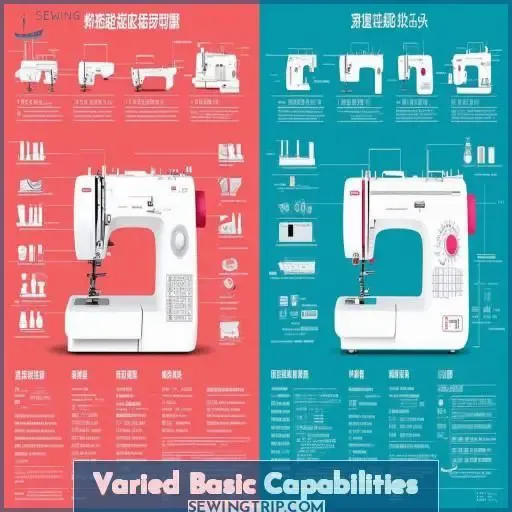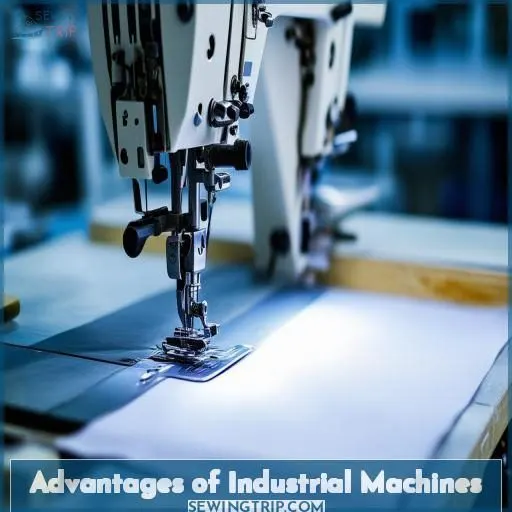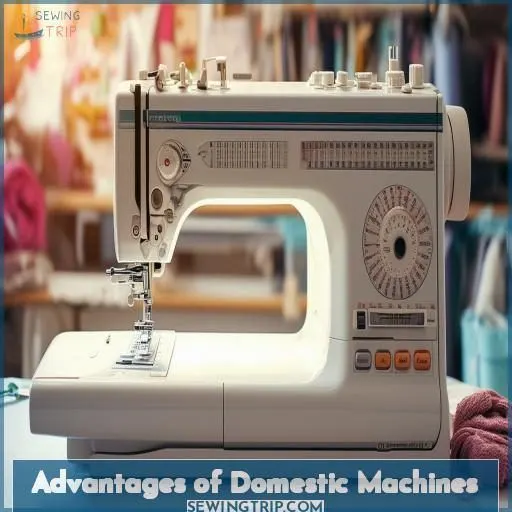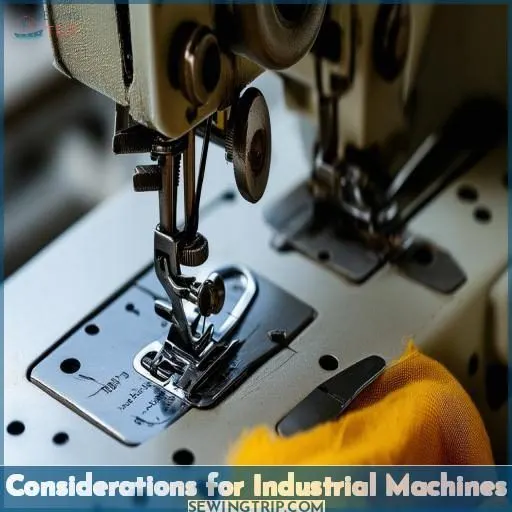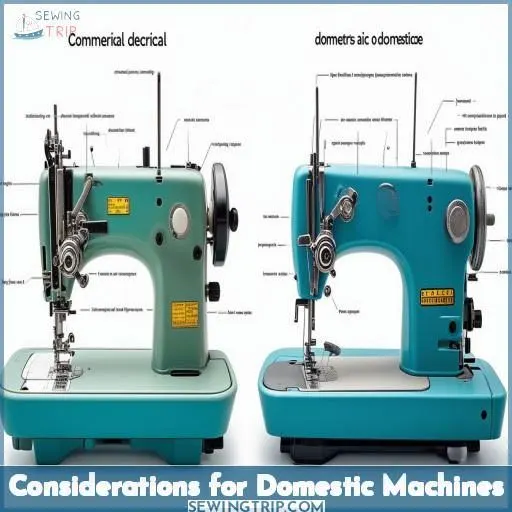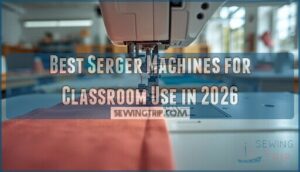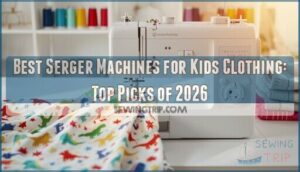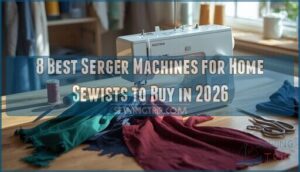This site is supported by our readers. We may earn a commission, at no cost to you, if you purchase through links.
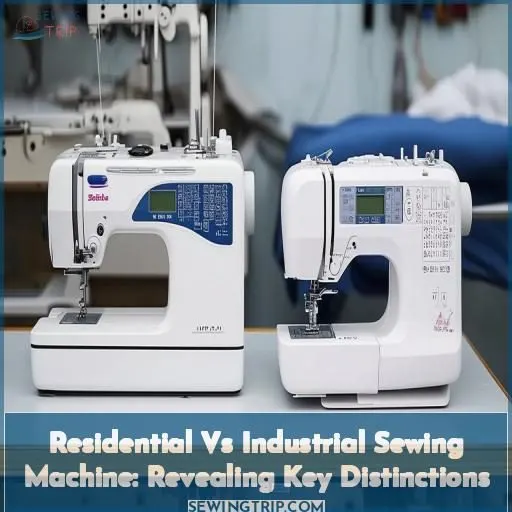
Industrial machines are built like tanks – heavy, durable workhorses designed for professional, high-speed sewing on tough materials. They’ll sew through anything, but good luck trying fancy stitches.
Residential machines, on the other hand, are nimble, user-friendly, and perfect for home projects that don’t require industrial strength. While slower and less durable, they offer a wide variety of decorative stitches.
Ultimately, your sewing goals and budget will determine which machine suits you best. But for a deeper dive into their contrasts, read on.
Table Of Contents
- Key Takeaways
- Maintenance Differences
- Cost Variation
- Weight Discrepancies
- Variation in Sewing Speed
- Disparity in Durability
- Varied Basic Capabilities
- Advantages of Industrial Machines
- Advantages of Domestic Machines
- Considerations for Industrial Machines
- Considerations for Domestic Machines
- Frequently Asked Questions (FAQs)
- Conclusion
Key Takeaways
- Industrial sewing machines are built like tanks – heavy-duty workhorses designed to sew through anything from thick canvas to leather upholstery. These bad boys can handle high speeds and non-stop production lines, but don’t expect fancy stitches from these no-nonsense beasts!
- Residential sewing machines, on the other hand, are the nimble, user-friendly sidekicks perfect for home projects that don’t require industrial strength. While they can’t match the sheer power of their commercial cousins, they offer a wide variety of decorative stitches to add that personal touch to your creations.
- When it comes to maintenance, industrial machines are like high-performance sports cars – they need regular tune-ups, oiling, and cleaning to keep them running smoothly. Residential machines, however, are more like reliable family sedans – they may require less intensive upkeep, but repairs can be trickier.
- At the end of the day, it’s all about finding the right fit for your sewing goals and budget. Industrial machines are the heavy-hitters for professionals and serious hobbyists, while residential models are the perfect companions for casual crafters looking to add a touch of whimsy to their projects.
Maintenance Differences
Regarding maintenance, industrial and residential sewing machines differ significantly.
Industrial machines are engineered for heavy-duty usage, necessitating regular cleaning and lubrication for smooth operation. Although this may appear inconvenient, it’s a modest investment for the durability and performance these machines provide.
Conversely, residential machines are crafted for lighter usage and often require less upkeep. However, when problems arise, the intricate design of many residential machines can render repairs and replacements more challenging.
The maintenance required is ultimately contingent upon the brand and specific model, as well as the user’s proficiency. Selecting a well-crafted machine from a reputable manufacturer can yield long-term savings in maintenance costs and enhanced performance.
Cost Variation
When considering the cost variation between residential and industrial sewing machines, there are distinct differences to contemplate:
- Cost difference: Industrial machines tend to be more expensive upfront compared to residential machines due to their heavy-duty construction.
- Affordable options: Despite the initial higher cost, there are budget considerations available in the market for both residential and industrial machines, ensuring there’s something for every price range.
- Value for money: When making a price comparison between residential and industrial machines, it’s important to assess the features, durability, and long-term cost efficiency to determine the best fit for your sewing needs.
Weight Discrepancies
Regarding weight, residential and industrial sewing machines differ significantly. Domestic machines are light and easy to carry, making them perfect for small storage spaces and portable sewing projects (Source). In contrast, industrial machines are heavy due to their durable construction, designed for stationary use in commercial settings .
| Feature | Residential | Industrial |
|---|---|---|
| Weight | Lightweight | Heavy |
| Portability | Highly portable | Less portable |
| Storage | Suitable for limited spaces | Requires dedicated space |
| Mobility | Easy to move around | Difficult to relocate |
While the portability of residential machines is a major advantage, industrial models prioritize durability and performance over mobility . Consider your sewing needs and available space when choosing between these weight classes.
Variation in Sewing Speed
When comparing the sewing speed of residential sewing machines to industrial ones, one notable distinction is the significant variance in sewing speed capabilities.
Industrial sewing machines are specifically designed for high production needs and repetitive tasks in an industrial environment, providing a substantial speed advantage over residential sewing machines. This feature makes industrial machines ideal for heavy-duty materials and tasks that require a faster sewing speed to enhance efficiency and productivity.
In contrast, residential sewing machines typically offer lower sewing speeds, which are more suitable for light to medium-duty use and shorter projects. This distinction highlights the specific speed functions of each machine category specific to their intended usage scenarios.
Disparity in Durability
As you’ve seen, industrial sewing machines are built for speed, but their true strength lies in their unparalleled durability.
These workhorses are designed to handle heavy-duty thread, heavy-weight fabric, upholstery material, and more, making them the ideal choice for extended use in industrial settings. Domestic machines, while capable, simply can’t match the industrial strength of their commercial counterparts.
When it comes to repair requirements, industrial machines may need expert servicing, but their replaceable parts make maintenance a breeze.
And with lifespans that can stretch up to 25 years, it’s no wonder savvy sewers are ditching their domestic machines in favor of used industrial sewing machines that pack a punch.
Varied Basic Capabilities
When comparing residential and industrial sewing machines, their basic capabilities have a noteworthy impact on beginner projects.
Industrial machines boast higher speeds, enhanced stitch quality, and superior durability, making them ideal for intricate projects. They can handle a variety of materials, from delicate fabrics to heavy-duty textiles.
Versatility is a key feature, allowing for a wider range of sewing tasks. Despite their focus on functionality, these machines often deliver aesthetically pleasing results.
In contrast, industrial machines may lack the fancy stitches found in domestic models but excel in speed and precision.
Beginner sewers can benefit from exploring the capabilities of both machine types to enhance their sewing projects.
Advantages of Industrial Machines
Industrial sewing machines excel in high-performance sewing quality, surpassing domestic models with their capability to handle heavy-duty threads and fabrics seamlessly. Their robust construction not only facilitates faster sewing speeds, ideal for repetitive tasks and production work, but also often incorporates built-in extras such as extension tables, quilting capabilities, and even sergers for added versatility.
High-Performance Quality
Industrial sewing machines deliver high-performance quality for commercial sewing needs. Enjoy:
- Precision stitching on heavy-duty fabrics
- Durable construction for extended use
- Built-in extras like extension tables and free-motion quilting
Faster Sewing Speed
Industrial machines excel at faster sewing speeds, boosting productivity for large projects and repetitive tasks. Domestic machines prioritize versatility over raw speed, making them better suited for lighter materials and occasional use.
| Sewing Speed | Industrial | Domestic |
|---|---|---|
| Productivity | High | Low |
| Efficiency | High | Low |
| Projects | Large | Small |
| Materials | Heavy | Light |
Heavy-Duty Thread and Fabric Handling
Industrial machines excel at handling heavy-duty threads and fabrics, allowing you to tackle:
- Thick materials like leather and canvas (Source)
- Bulky projects such as upholstery and boat sails
- High-volume workloads with ease
Built-in Extras
Industrial machines often include built-in extras like extension tables, quilting options, and sergers, providing versatility and convenience for advanced sewing projects and heavy-duty materials .
Advantages of Domestic Machines
If you’re seeking sewing machines suited for home use, domestic models offer a distinct advantage with their ability to produce fancy stitches that industrial counterparts often lack. Additionally, domestic machines require minimal cleaning, making them a convenient choice for casual sewers who don’t want the hassle of frequent maintenance.
Fancy Stitches
Domestic machines excel at fancy stitches like automatic buttonholes, decorative stitches, blind hems, monograms, and appliqués, allowing you to add unique touches to your creations with ease.
Minimal Cleaning
Domestic machines require minimal cleaning, making them ideal for users with limited storage space or those who prioritize portability and ease of use over advanced features.
Slower Sewing Speed
In domestic sewing machines, slower sewing speed offers advantages such as improved task suitability, better user expertise, and enhanced project complexity management. These features contribute to a more efficient comparison with faster sewing speeds .
- Enhanced Task Suitability
- Better User Expertise
- Improved Project Complexity Management
Lower Sewing Quality
Domestic machines may not match industrial stitch quality, especially for thick materials and complex projects. However, they’re ideal for light use and easy repairs (Source).
| Stitch Quality | Material Thickness | Project Complexity | Intended Use | Repair Difficulty |
|---|---|---|---|---|
| Lower | Light | Simple | Home | Easy |
Considerations for Industrial Machines
An essential consideration for industrial sewing machines is the requirement for regular cleaning and oiling to maintain efficient performance. Additionally, many industrial models are designed with only one or two basic stitches, limiting their adaptability compared to domestic machines with a wider range of decorative stitches.
Cleaning and Oiling Requirements
Industrial machines require regular maintenance to keep them running smoothly. Follow a strict lubrication schedule, clean components frequently, and oil moving parts as needed. Neglecting essential maintenance can lead to decreased performance and lifespan. Consult your machine’s manual for specific cleaning and oiling instructions appropriate for your model.
- Adhere to manufacturer’s maintenance frequency guidelines
- Develop a consistent cleaning regimen for ideal performance
- Regularly lubricate moving parts per the recommended oiling schedule
- Prioritize essential maintenance to extend your machine’s lifespan
Limited Stitches
While industrial machines excel in heavy-duty performance, their stitch variety may be limited compared to domestic models. However, this trade-off allows for superior stitch quality and the ability to handle a wider range of thread and fabric weights. Prioritize your sewing needs to determine if limited stitches are a dealbreaker or a worthwhile compromise.
| Stitch Variety | Stitch Quality | Thread Weight | Fabric Weight |
|---|---|---|---|
| Domestic: High | Industrial: High | Domestic: Varied | Industrial: Heavy |
| Industrial: Low | Domestic: Varied | Industrial: High | Domestic: Light |
Considerations for Domestic Machines
When considering a domestic sewing machine, you’ll need to assess whether it can handle the heavy-duty materials required for your projects, as these machines are typically designed for lighter fabrics. Additionally, domestic machines often lack built-in extras like extension tables, quilting options, or sergers that can enhance versatility and productivity.
Handling of Heavy-Duty Materials
When considering domestic sewing machines for heavy-duty materials, focus on their capacity to handle thick fabrics and strong threads suitable for heavy-duty sewing tasks and industrial applications.
These machines should demonstrate robustness in dealing with heavy fabrics and demanding projects, enabling efficient and reliable sewing operations on materials requiring enhanced durability and resilience.
Selecting a machine with appropriate material handling capabilities is essential for achieving successful heavy-duty sewing tasks.
Lack of Built-in Extras
Domestic machines may lack the versatility of industrial models, with limited functions and a compact, lightweight design prioritizing portability over advanced features. While suitable for basic tasks, they often fall short in handling heavy-duty materials and lack the built-in extras found in their industrial counterparts, such as extension tables or quilting options .
Frequently Asked Questions (FAQs)
What is the difference between industrial and home sewing machines?
Industrial sewing machines handle heavy fabrics quickly while home machines excel at decorative stitches and lighter materials. You’ll find industrial models are built sturdier but louder and costlier.
How do you know whether a tool is made for industrial or domestic use?
If it’s big, heavy, and built for non-stop work, it’s likely industrial. Light, portable machines with limited features? Those are for home use.
What makes an industrial sewing machine?
Industrial sewing machines are powerhouses built to tackle heavy-duty tasks with top-speed efficiency. Their robust motors and heavy metal construction allow them to seamlessly work through thick materials and run for extended periods. These machines mean serious business!
Do I need an industrial sewing machine?
You’ll need an industrial machine if sewing frequently with heavy materials like canvas, leather, or denim. Otherwise, a domestic machine suits occasional home projects using lightweight fabrics.
Can industrial machines sew leather and vinyl?
Yes, industrial sewing machines excel at stitching thick, heavy materials like leather and vinyl. Their powerful motors and sturdy construction make them ideal for tackling dense, durable fabrics found in upholstery, automotive, and leather goods manufacturing. Invest in an industrial machine for your heavy-duty sewing needs.
Are industrial machines suitable for home use?
Although industrial machines offer power and speed, they’re not ideal for home use. The hefty size and noise make them impractical for tight living spaces. Unless you need heavy-duty sewing capabilities, a domestic machine suits occasional home projects better.
How often do industrial machines require maintenance?
You’ll need to give your industrial machine regular maintenance. These workhorses require frequent cleaning, oiling, and occasional part replacements to keep them running smoothly for high-volume sewing.
Can domestic machines handle multiple layers of fabric?
You’ll likely struggle to sew through thick layers with a domestic machine. Their motors aren’t powerful enough to punch through multiple fabrics efficiently – the needle bogs down, skips stitches, or breaks. For multi-layer projects, an industrial machine‘s brawn gives you the oomph needed to sail through effortlessly.
Are industrial machines louder than domestic machines?
Yes, industrial sewing machines tend to be noisier than domestic ones due to their heavy-duty construction and powerful motors designed for extended, high-speed operation.
Conclusion
Aye, mateys! Whether you be a swashbuckling seamster or a domesticated crafter, choosing between a residential vs industrial sewing machine boils down to your needs.
Industrial machines offer unmatched speed, durability, and heavy-duty capabilities.
While residential ones excel at decorative stitches and user-friendliness.
Weigh your sewing goals, budget, and workshop space to make a judicious choice that will keep you stitching happily, be it for profit or pleasure.

